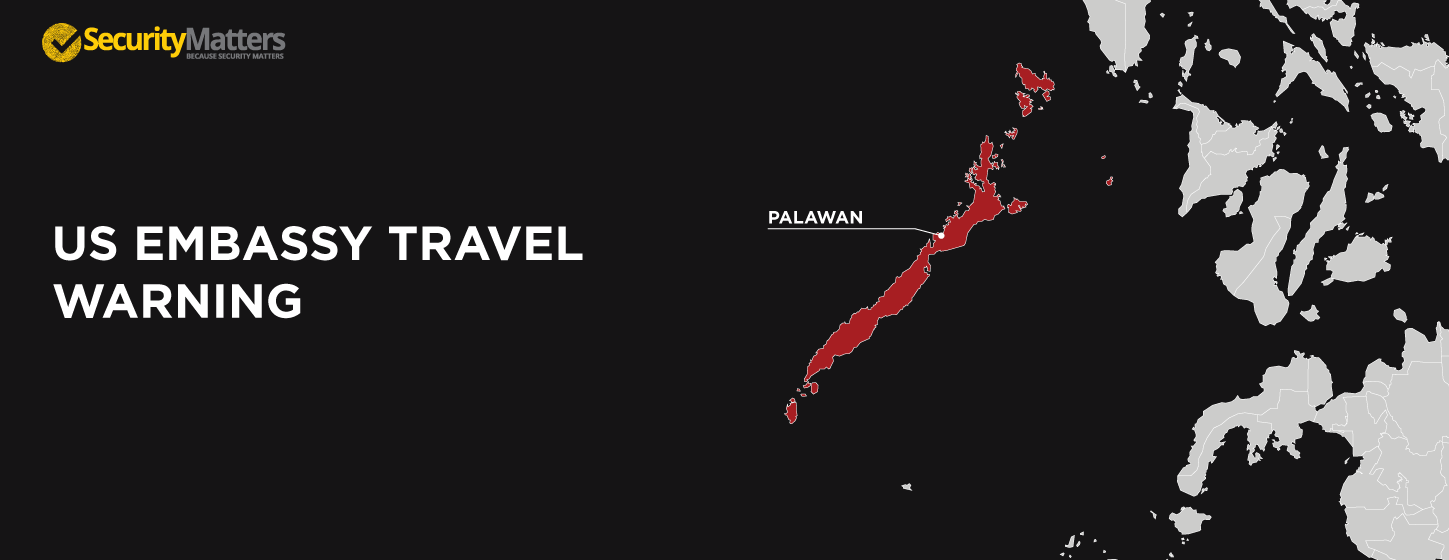US Embassy warns mission personnel of kidnapping threat, as the 16th anniversary of the Dos Palmas kidnapping incident draws near.

Manila City — The United States Embassy in Manila warned all mission personnel of a kidnapping threat in the province of Palawan, in an internal advisory dated 09 May 2017.
The advisory, which comes from the embassy’s Regional Security Office, stated that they have received “credible information that terrorist groups may be planning to conduct kidnapping operations targeting foreign nationals in the areas of Palawan Province, Philippines, to include Puerto Princesa City, and the areas surrounding Puerto Princesa Subterranean River National Park. Mission personnel are advised to avoid travel to the aforementioned areas and are reminded to review personal security plans, avoid large crowds and gatherings, and remain vigilant at all times.”
Puerto Princesa City is about 630 kilometers southwest of Manila; and some 500 kilometres northwest of Mindanao, known stronghold of the Abu Sayyaf Group (ASG). Recently, the extremist group has operated farther from their base. Just last month, they attempted a kidnapping / bombing raid in Bohol, accessing the Visayas province via sea and river. The members of the ASG were foiled by government security forces, and one prominent ASG sub-leader was slain in the firefight.
The specificity of the travel warning lends more credence to the embassy’s intelligence sources, with its unequivocal pinpointing of a tourist spot a marked difference from previous advisories. In a statement released on their official Facebook account, the management of the Puerto Princesa Underground River assured the public that they have already coordinated with the local police and the Armed Forces of the Philippines, and is on heightened alert.
Meanwhile, the military public affairs chief Col. Edgard Arevalo told the media that it had not monitored any threats and that the information was not sourced from the Armed Forces of the Philippines, but will nonetheless take heed of the kidnapping advisory. PNP spokesperson Chief Supt. Dionardo Carlos told reporters that stricter security measures will be undertaken as they verify the US Embassy’s information.
Palawan’s history with terrorism
In 2001, Palawan was at the center of a globally notorious kidnapping incident: On 27 May 2001, members of the Abu Sayyaf seized twenty hostages from the affluent Dos Palmas Resort, situated in a private island in Honda Bay, Palawan. Among the hostages were four resort personnel and three Americans, identified as Martin and Gracia Burnham, missionaries from the state of Kansas who were celebrating their 18th wedding anniversary, and Guillermo Sobero, a Peruvian-born American from California. Most of the hostages, however, were Chinese-Filipino tourists.
The kidnapping resulted in the deaths of at least five of the original Palawan hostages, including Guillermo Sobero and Martin Burnham.
This recent travel warning may be seen as a mirror of the 2001 kidnapping spree, as the Abu Sayyaf Group then conducted numerous raids in Basilan following their seizure of the Palawan resort. Contemporaneous news reports suggested that at least 100 hostages were taken and around 20 murdered in total in just over a year up until the final assault and freeing of Gracia Burnham on June 7, 2002.
Travel warnings for the Philippines
The province-specific travel warning is the U.S. Embassy’s second this 2017; the first being a travel warning issued over Bohol and Cebu simultaneously, just days before the Abu Sayyaf incident in Bohol.
The embassy reminded personnel of the Worldwide Caution raised last 06 March 2017, indicating there is an ongoing threat of terrorist actions and violence against United States citizens and interests abroad, including the Philippines. The memo cautioned: “Extremists have targeted sporting events, theaters, markets, mass transportation systems—including airlines, and other public venues where large crowds gather. Crowded nightclubs, shopping malls, buses and popular restaurants have also been targets.”
The U.S. State Department, last December 2016, warned U.S. citizens to “avoid all nonessential travel to the Sulu Archipelago and through the southern Sulu Sea, and to exercise extreme caution when traveling to the island of Mindanao, due to continued terrorist threats, insurgent activities, and kidnappings.”





